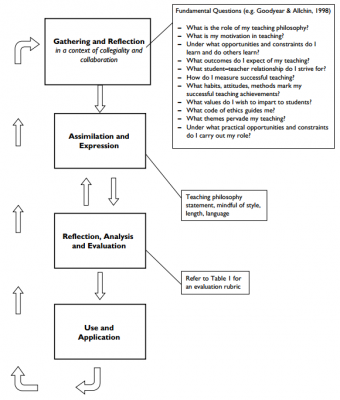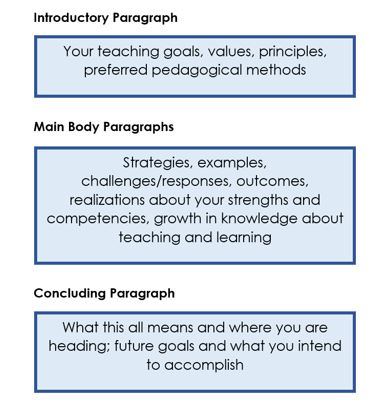Why write a teaching philosophy?
Writing teaching philosophies has become a common practice among educators, as they can be useful—and are often recommended or required—in job applications for faculty positions and in the promotion and tenure review process.
Instructors also find the writing process instrumental in making their own teaching more deliberate and intentional: We often teach without ever really thinking about long-term goals, but the process of writing a teaching philosophy encourages the kind of consideration and reflection that can ultimately improve our effectiveness in the classroom.
Access to your teaching philosophy can also be helpful to students who want an early sense of what you will be like as a teacher, so consider adding it to a your syllabus or learning management system and discussing it early in the semester.
Where to start...
Review current research on the scholarship of teaching and learning in your field. Note anything that you find interesting or helpful (e.g., terminology and current trends that you might mention), and think about how this information applies to your own teaching. Jot down notes about the teaching practices you use that are highly valued in education today; for example, the ways in which you
- Focus teaching on higher-order learning
- Refrain from depending too much on lecture
- Collaborate with colleagues
- Integrate a variety of active learning exercises
- Engage in outreach and community involvement
- Incorporate online tools and resources
Consider the situational factors that have influenced your teaching. What unique situations apply to you and your classroom (e.g., the context of the teaching and learning situation, the nature of the subject, characteristics of the learners and of the teacher)
Ask yourself general questions about your teaching—questions like:
- Why do I teach?
- What does good teaching mean to me?
- What does effective learning mean to me?
- Do I have a particular teaching style or approach? If so, how would I describe it?
- What makes me unique as a teacher?
- What do I expect from my students?
- What can my students expect from me?
- What do I do to continue to improve?
Consider these more specific topics as you seek to characterize your particular style:
- Why teaching is important to me
- My concepts or views on how people learn and how I facilitate that learning
- The teaching strategies I use to promote student learning
- How I know that my classroom practices are effective
- The learning environment I seek to create in my classroom
- How I determine that students have achieved desired outcomes
- The role my teaching plays in the context of my career or lifelong goals
- How I teach topics about which I am not an expert
- How I work with students who are academically struggling
- What my syllabi say about my teaching style
- How my teaching has changed in the last five years
Continue gathering information and reflecting on your teaching experiences: Schönwetter, et al (2013), suggest that the evolution of a teaching philosophy statement is cyclical and continuous:

Write a few draft teaching philosophies: Try creating several versions (e.g., a paragraph-long version and another that’s closer to a page in length, or perhaps separate teaching philosophies for each course). It makes sense to keep a series of various types and sizes of these documents on hand.

Review the final product: Because you will likely present your teaching philosophy in your CV, the promotion and tenure process, and other interactions with influential audiences, ensure that the document is clear, concise and effective. Consider asking peers to review and comment on the draft or use a rubric to evaluate your philosophy statement.
Tips:
- Though you might find it helpful to read others’ teaching philosophies, recognize that your teaching philosophy is unique to you and your specific teaching situation, so there is no one-size-fits-all model.
- A teaching philosophy continually evolves as you progress through your career. Revise it often!
Additional Resources:
- Bain, Ken. What the Best College Teachers Do. Harvard University Press, 2004.
- Beatty, J.E., J.S.A. Leigh, & K.L. Dean. Philosophy rediscovered: Exploring the connections between teaching philosophies, educational philosophies, and philosophy. Journal of Management Education,33(1): 99-114, 2009.
- Faculty Focus Special Report: Philosophy of Teaching Statements (May 2009).
- Girash, J. Metacognition and instruction. In V.A. Benassi, C.E. Overson, & C.M. Hakala (eds.). Applying science of learning in education: Infusing psychological science into the curriculum, 2014.
- Kasachkoff, Tziporah. Teaching Philosophy: Theoretical Reflections and Practical Suggestions. Rowman & Littlefield Publishers, 2004.
- Kenkmann, Andrea, ed. Teaching Philosophy. Continuum International Publishing, 2009.
- Schönwetter, Dieter J., et al, Teaching philosophies reconsidered: A conceptual model for the development and evaluation of teaching philosophy statements. International Journal for Academic Development, 7:1, 83-97, 2013.
Quick Links
![]()
Consult with our CETL Professionals
Consultation services are available to all UConn faculty at all campuses at no charge.